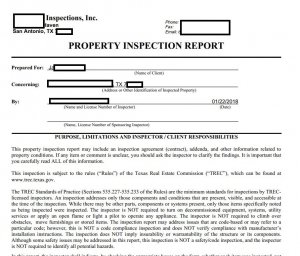When buying a property, there are two aspects of the escrow process that are integral to closing the deal and negotiating any final pricing details. The property inspector is a professional set of eyes highlighting areas that need or will soon need attention. Lenders often hire the appraiser, though if it is a cash or alternative financing deal, the buyer can choose the appraiser who gives a current fair market value based on market and property conditions.
A Licensed Professional
Property inspectors and appraisers should both be licensed professionals. When you choose a property inspector, they need to be contractors licensed by the state and understand how to identify areas of concern when it comes to key components of the home including electrical, plumbing, HVAC, roof and foundation issues in the home. They are also trained to look at landscaping to advise on city codes regarding water flow and drainage around the home. While they are trained to identify areas of concern, they are NOT experts in all areas.
Appraisers are licensed by the state. The Appraiser Qualification Board sets federal standards for appraiser’s to review the home and establish a current market value. The appraiser reviews the size, location and condition of the home and compares it to recent and other existing sales in the immediate area. Appraisers are not hired by the seller or buyer in Texas. The lender orders the appraisal through a mortgage system. The appraiser is not allowed to have contact with the parties so as to not sway their appraisal as noted below. They do sometimes speak to the listing agent for factual information and to gain access to the property.
Local to the Area
Don’t let an inspector or appraiser convince you they are experts everywhere. City codes and weather conditions are very different in a beach  community than a mountain location. As such, an inspector who regularly works in your area will be keen to see common problem areas specific to that area. This is a good point to remember as each area has unique types of soil or different city or county codes.
community than a mountain location. As such, an inspector who regularly works in your area will be keen to see common problem areas specific to that area. This is a good point to remember as each area has unique types of soil or different city or county codes.
The same is true for appraisers who might not understand the difference in pocket communities. Large cities often have areas that are referred to as pockets where the value of homes in a six-block radius is substantially higher than just a few blocks away. If an appraiser doesn’t understand the way the pockets work in Floresville, they may pull comparable property data from the less desirable community skewing the final appraisal. This is common in San Antonio but can be a bigger issue in rural communities as subdivisions or the lack thereof can be a mixed bag and that affects pricing also.
Price is Not the Answer
Don’t choose either a property inspector or an appraiser based on price. While there are many expenses going into a property purchase, the cheapest doesn’t determine the best or the worst for these tasks. Take the time to review costs and understand the average price of each in Floresville. Then review the credentials and talk to local realtors to find out who is commonly used. You’ll find that many different realtors use the best providers regardless of what realty company they represent. Realtors have inspectors who they have worked with in the past and can recommend good ones but it is ultimately the buyers’s choice as they must trust their inspector.
Ask Lots of Questions
Anyone you are hiring should be open to answering your questions. When it comes to property inspections, find out what is seen commonly in the area. While some termite damage might be common in some areas, it might be a huge concern in others. Inspectors should be willing to review the entire report with you and explain why certain things are deemed as a serious issue while others seem to get shrugged off as cosmetic. The inspectors my clients worked with have always been willing to thoroughly explain each item with them. They are also open to me asking questions so that I properly understand the report to correctly convey the buyers’ wishes for repairs to the listing agent.
While many property buyers won’t choose the appraiser who is hired by the lender. In fact, lenders will work diligently to ensure the appraisal is done without the buyers or sellers present in many cases. This is to get an objective value of the home without anyone influencing it based on personal desires for to get inflated pricing to meet inflated sales prices and loan needs.
If you are able to hire or speak with the appraiser, find out how they define the parameters for comparable properties. Ask to review recent appraisals and get a sense of whether they tend to appraise close to sales prices, higher or lower. If the appraisal comes in low or has some questionable information the agents are allowed to dispute it with their own facts.
